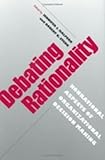Debating Rationality : Nonrational Aspects of Organizational Decision Making / ed. by Robert C. Stern, Jennifer J. Halpern.
Material type: TextSeries: Frank W. Pierce Memorial Lectureship and Conference SeriesPublisher: Ithaca, NY : Cornell University Press, [2018]Copyright date: ©1998Description: 1 online resource (296 p.)Content type:
TextSeries: Frank W. Pierce Memorial Lectureship and Conference SeriesPublisher: Ithaca, NY : Cornell University Press, [2018]Copyright date: ©1998Description: 1 online resource (296 p.)Content type: - 9781501725470
- 658.4/03 23
- online - DeGruyter
| Item type | Current library | Call number | URL | Status | Notes | Barcode | |
|---|---|---|---|---|---|---|---|
 eBook
eBook
|
Biblioteca "Angelicum" Pont. Univ. S.Tommaso d'Aquino Nuvola online | online - DeGruyter (Browse shelf(Opens below)) | Online access | Not for loan (Accesso limitato) | Accesso per gli utenti autorizzati / Access for authorized users | (dgr)9781501725470 |
Frontmatter -- Contents -- Acknowledgments -- Abbreviations -- Introduction -- PART I. THEORETICAL DISPUTES -- 1. Prescriptive Models in Organizational Decision Making -- 2. Game Theory and Garbage Cans: An Introduction to the Economics of Internal Organization -- 3. Behavioral Economics and Nonrational Organizational Decision Making -- 4. Can Negotiators Outperform Game Theory? -- 5. Playing the Maintenance Game: How Mental Models Drive Organizational Decisions -- PART II. NEW FOUNDATIONS OF RESEARCH -- 6. Organizational Contracting: A "Rational" Exchange? -- 7. Transaction Cost Economics and Organization Theory -- 8. Toward a Psychology of Contingent Work -- PART III. STRETCHING THE BOUNDARIES -- 9. Bonded Rationality: The Rationality of Everyday Decision Making in a Social Context -- 10. Endogenous Preferences: A Structural Approach -- References -- Contributors -- Index
restricted access online access with authorization star
http://purl.org/coar/access_right/c_16ec
Decision makers strive to be rational. Traditionally, rational decisions maximize an appropriate return. The contributors to this book challenge the common assumption that good decisions must be rational in this economic sense. They emphasize that the decision-making process is influenced by social, organizational, and psychological considerations as well as by economic concerns. Relationships, time pressure, external demands for specific types of performance, contractual expectations, human biases, and reactions to unfair treatment alter the decision-making context and the resulting decision outcomes.
Mode of access: Internet via World Wide Web.
In English.
Description based on online resource; title from PDF title page (publisher's Web site, viewed 26. Apr 2024)


